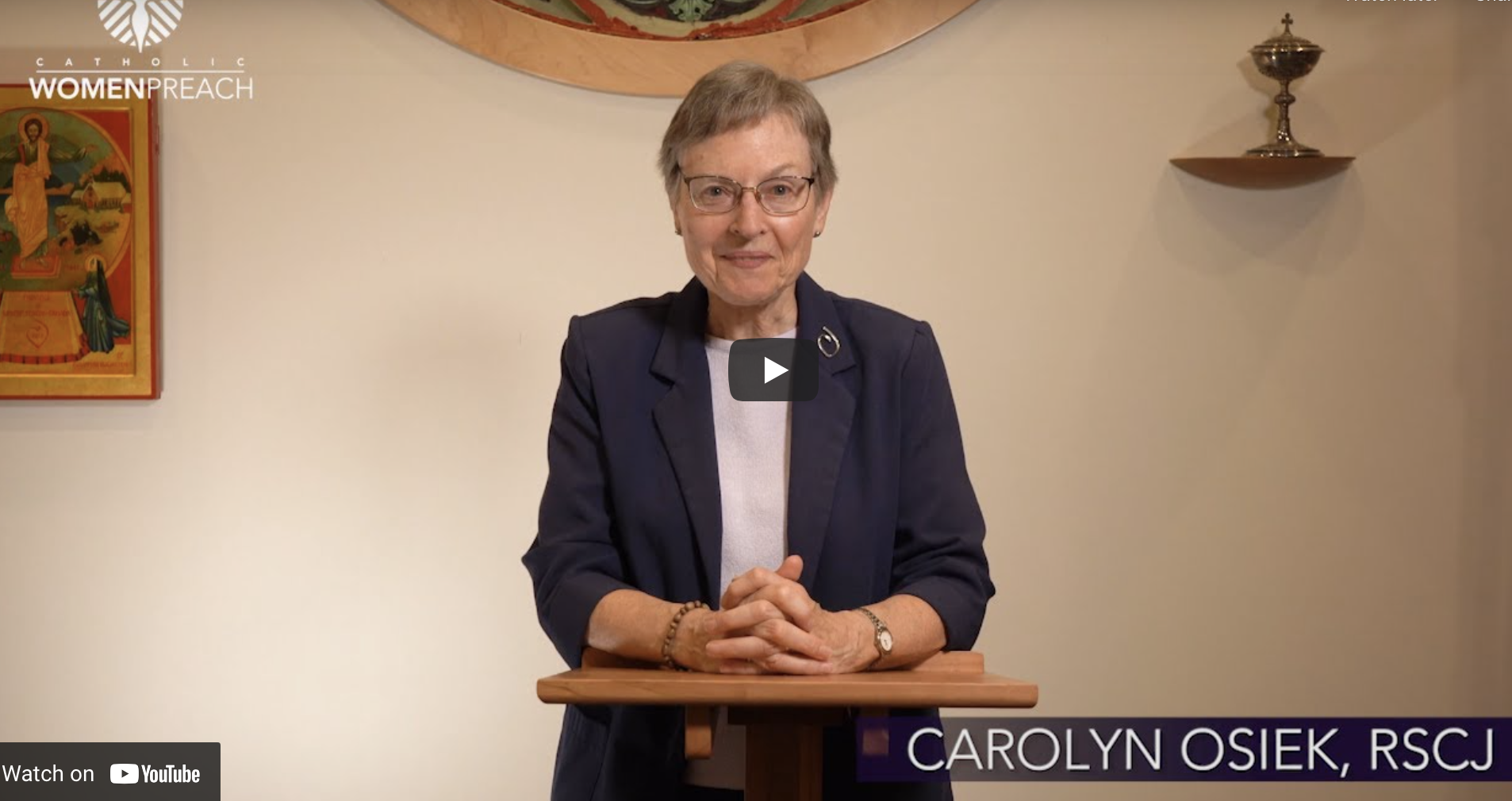Carolyn Osiek, RSCJ, preaches for the Feast of Saint Phoebe
Romans 16:1-2 is a gold mine of information about the world around Paul, that NEVER appears at all in the lectionary! It is about an otherwise unknown woman named Phoebe (whose name means “radiant”). She has a feast day in both the Eastern and Western Church on September 3 (though on October 25 in the Lutheran Church), but Pope Gregory the Great (590-604 CE)—remember him? The one who started the rumor that Mary Magdalene was a prostitute—got his feast moved from March 12 to, guess when? September 3, the anniversary of his election, thus displacing Phoebe. A pope’s feast is always more important. The Roman Martyrology, the official Catholic list of saints, 2004 edition, calls her ancilla Domini (handmaid of the Lord) among the faithful of Cenchrae (a seaport about six miles from land-locked Corinth, identified in the text as her residence).
But she is much more than a handmaid. Listen to what Paul has to say about her:
“I commend to you Phoebe our sister, diakonos of the church of Cenchrae, so that you will receive her in the Lord in a manner worthy of the holy ones, and assist her in whatever way she may ask you, because she has been a prostatis of many and of me, too.”
Let’s unpack that. I did not translate two words Paul uses of her. You will see why.
Paul is introducing Phoebe to people who do not know her, the Christian believers in Rome. Actually, he does not know most of them either, but they know him at least by reputation. Now he is asking for reciprocity. She has done so much for other members of this extended Christian community, so would you please do the same for her?
First, he calls her “our sister,” meaning a believer in Christ, a member of the Christian community.
Second, he calls Phoebe Diakonos. Here are three alternative attempts at translation: servant, deacon/minister, or the office of deaconess, which did not yet exist until about two hundred years later. This word carried connotations of both service and agency or representation—“minister” is good, because it connotes both service and authority at the same time. An important comparison here is with Phil 1:1, where Paul greets the holy ones in Philippi with their episkopoi and diakonoi. Never mind the episkopoi for now, but here is another example of people in a local community with the same title diakonos, this time plural. Whatever those diakonoi did in Philippi, Phoebe did in Cenchrae.
When speaking of the beginnings of the diaconate, most will think about Stephen and his six friends in Acts of the Apostles chapter 6. In spite of traditional interpretation of this scene as origin of the diaconate, in fact none of them is ever called a deacon. Let us enjoy the irony that the only person in the New Testament who by name is called a deacon of a local church– is a woman. When a passage is excluded from the lectionary, we hope the editors just thought it was not important. Maybe this time, though, there was more to it.
The third thing that Paul calls Phoebe is prostatis to many, including himself. The translation alternatives that you will see are helper or benefactor/patron. Helper, in a subordinate sense, is just plain wrong. She is not Paul’s assistant, but his benefactor or patron. The society was a big patronage system, where it was not what you know but whom you know, so having the right patron when you are new in town was crucial.
Many megabytes have been expended (We used to say “much ink spilled”) on this word prostatis. Luckily, we know about a contemporary of Phoebe right there in Corinth: her name is Junia Theodora. Her grateful clients left commemorative inscriptions that said she did the same thing for them. She was not a Christian, but she was an immigrant who made it big. She came from Lycia in western Turkey and became the key person for others from her home region who came to Corinth. She provided hospitality and social connections for them—introductions to the right people. We can suppose something of the same for Phoebe with regard to other Christians coming to Corinth, including Paul.
But now, Phoebe is going to Rome on her own business, though we do not know any details about it—giving Paul the opportunity to write to the believers there. She is therefore the probable reader and interpreter of his letter when she gets to Rome and delivers it.
There are not many statues of Phoebe, but there is one in St Austin Church, Austin, Texas, by artist Mark Carroll. I have not been there, but you can see that Phoebe is holding the scroll of Paul’s letter in her left hand, with her right hand in the gesture of speaking.
[Photo: artist Mark Carroll, photographer Mark Landers. Courtesy Louise Nelson]
Phoebe is another woman silenced in the lectionary, but who was not so silent in her own context. She was a woman of influence: minister, deacon, and sponsor of one of the earliest churches.
Phoebe was a woman who used her social status and power for the good of others and for the spread of the Gospel. We remember her, even though she was thought not important enough—or perhaps too important—to be included in the lectionary. Perhaps we could reflect on how we use whatever social power we have, to influence, to provide resources, to call out injustice, to come to the aid of the needy, to further the proclamation of the Good News. If we do that, Phoebe will be proud to have us as her successors.
